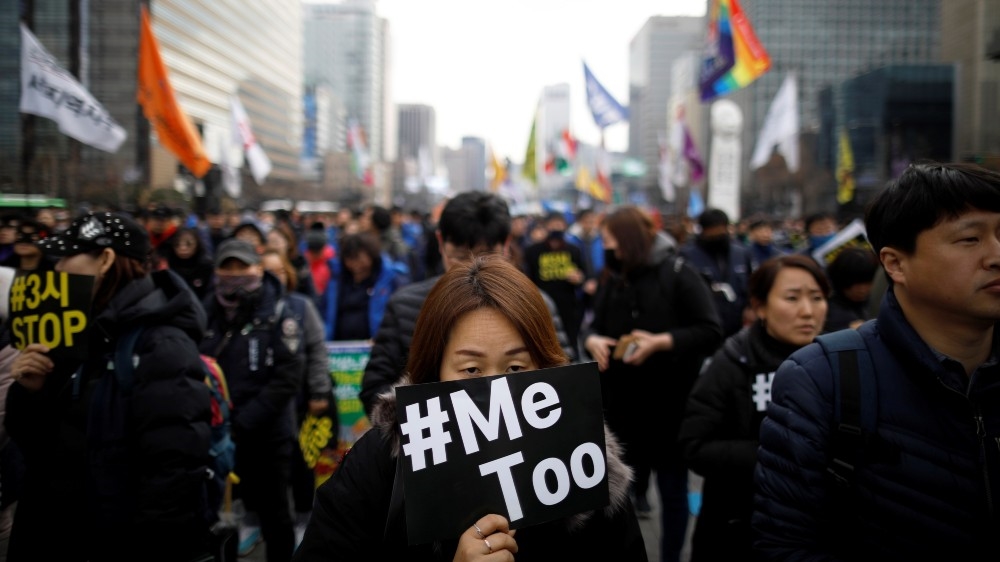New arrest amid nationwide anger over S Korea ‘sextortion’ case
Women call for new laws on digital sex crimes, after Nth Room case exposes vulnerability of young in wired nation.

Seoul, South Korea – South Korean police on Monday said they had taken a 24-year-old man into custody in connection with the Nth Room, an online sextortion ring that has shocked the nation and driven renewed calls for tougher laws to deal with digital sex crimes.
The man has been accused of creating some of the chatrooms that were used by the Nth Room and has not been publicly identified, but police say he has confessed to being the person behind the username “God God”, which became infamous when the ring was first exposed in March.
Keep reading
list of 3 itemsOfficials arrest 338 worldwide in dark web child porn bust
South Korea ‘sextortion’: ‘Telegram’ case suspect identified
Three other people, including alleged ringleader Cho Ju-bin, have already been named, and more than 100 people apprehended.
“These women and children were enslaved, and we have never before imagined such perverted, sadistic, inhumane acts happening here,” said Chae Dae-Eun, director of the Korean Women Lawyers Association, which provides free legal assistance to victims of sex crimes.
“This has really shocked the public. I am a lawyer who has been involved in sex crimes for years, and even I am very shocked.”
The Nth Room ran on the encrypted messaging service Telegram, and the perpetrators used private information – sometimes collected illegally from local government offices – to blackmail many women and children into performing sexually explicit acts on camera, with thousands of users paying cryptocurrency to watch.
Demanding change
The victims included at least 74 women and 16 children – referred to as “slaves” by the perpetrators – in a case that has sparked rage, fear and renewed calls for change in a country that is no stranger to high-profile sexual violence. Many women say they are tired of seeing the same headlines over and over again.
“I was surprised, but at the same time, I wasn’t really, because I feel like this kind of stuff has been happening everywhere, all the time,” Yudori, a South Korean cartoonist and comic artist who focuses on feminist storytelling, told Al Jazeera English. “As long as you paid, anyone could have access to these videos, and it just went on for far too long.”
|
|
Since at least 2012, there have been busts on illegal footage filmed using tiny, pea-sized spy cameras and shared on “webhard” P2P file-sharing platforms.
In 2016, the South Korean government shut down a popular website called Soranet after the mass dissemination of illegally-filmed sexual content (the site had more than a million users). That same year, sexual violence and misogyny became a highly-discussed national issue after a man who said he “hated women for belittling him” stabbed and killed a 23-year-old woman in Seoul’s Gangnam Station.
Then, in 2018, the national conversation around sexual violence resurged amid South Korea’s #MeToo movement and mass protests against spycam porn illegally filmed in public restrooms and sold online.
The Nth Room and its many copycat chat rooms, however, have triggered a new level of alarm.
“People are being struck with utter fear,” said Lee Soo-jung, a professor of forensic psychology at Kyonggi University, “because they’re realising: ‘My child or loved one could be forced to film a video like that in my own bathroom.'”
“The fear is definitely there,” Yudori agreed. “My mum even asked my brother if he’s ever been in that chatroom. I was upset because my brother is an upstanding citizen, but my mum was like: ‘You never know.’ That shows how scared people are.”
Children among perpetrators
While the Nth Room is known to have involved at least 16 child victims, South Koreans have also been shocked by the age of some of the perpetrators.

More than two million people signed a petition urging the government to release Cho’s identity. The 24-year-old is now being charged with child pornography, sexual abuse, attempted murder and a litany of other crimes.
Meanwhile, others alleged to be involved include children aged between 12 and 17, who are accused of managing copycat chat rooms, distributing videos of the assaults or even selling them online. It remains unclear how law enforcement will deal with them, but Lee, who is consulting legislators on the case, warned the youngsters themselves could be victims.
“There is a trend of runaway youth becoming perpetrators of crimes and repeat offenders,” she said. “For example, some of these youth might have run away from home and might form a makeshift family among themselves. These youth often form a group where they eat together, sleep together and live together with the money they’re earning from sex crimes.”
“Personally, I wonder if those kids thought of it as some kind of game – some kind of alternate, virtual reality,” Chae added. “Maybe they saw the victims just as characters, because it was all hidden behind a smartphone, happening in a virtual space.”
South Korea’s court system is notorious for the lenient sentences given to convicted sex offenders.
“Most of the perpetrators of digital sex crimes are, first of all men, and most of them get off with like either a suspended sentence or a fine. It’s actually very rare to see someone get a maximum sentence,” said Haeryun Kang, a freelance journalist.
‘Portrait of rage’
Kang recently created a short film called Color of Rage: The Nth Room, which she calls “a portrait of the rage a lot of South Korean women are feeling”.
“After cases like these become national headlines, the government makes a taskforce and all these different politicians come up promising reforms and having crackdowns on these issues,” Kang added. “Basically, the historic response has been not very proactive or preventative.”

On April 29, South Korea’s National Assembly passed a string of bills to make digital sex crimes easier to prosecute. Under the new law, those who possess, buy, store or watch illegally-filmed sexual content can be sentenced to a maximum of three years in prison or 30 million won ($24,660). Before the new legislation was enacted, it was not illegal to possess such content.
In the case of the Nth Room, lawyers and experts like Chae are still faced with difficult legal grey areas because the perpetrators forced the victims to violate themselves; an area not specifically addressed under the law.
“The attacker might be found not guilty because of the lack of relevant laws,” Chae said.
“We need to revise the law to punish those who committed sexual crimes by ordering victims to perform sexual acts on themselves, and it needs to be treated as a direct sexual crime.”
However, the Nth Room may prove a turning point for South Korea, which is becoming increasingly disturbed by sexual assault and other organised crime that is taking place on people’s phones and computer screens – not just in shadowy alleys or illegal brothels.

“I think there’s a real lack of awareness for digital sex crimes,” Lee said. “But I think the Nth Room incident contributed the most to changing or shifting people’s understanding.”
“I do feel like scandals like the Nth room are fuelling the anger that women have and the support for feminism,” Kang agreed.
Mitch S Shin contributed to this report.